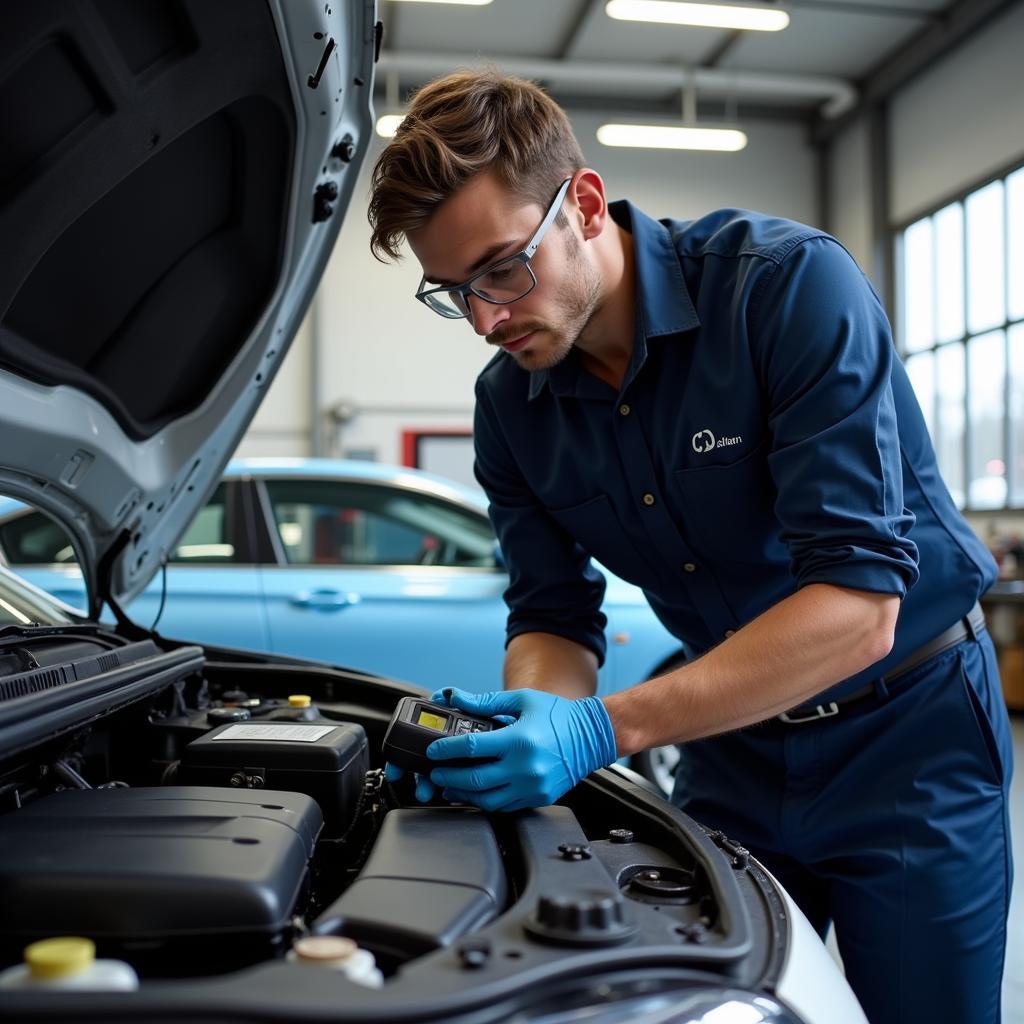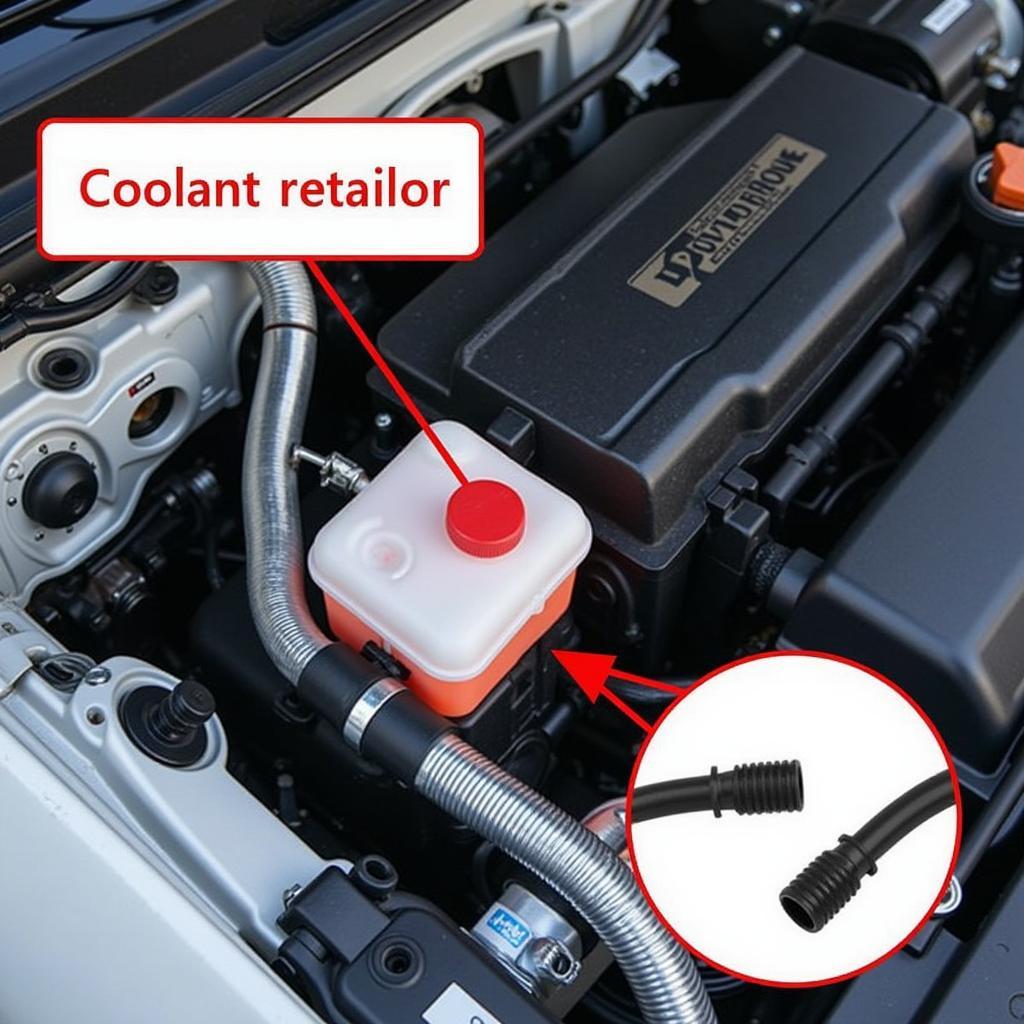Hybrid cars are becoming increasingly popular due to their fuel efficiency and reduced environmental impact. These vehicles, which combine a gasoline engine with an electric motor, offer a compelling blend of performance and sustainability. But when do hybrid cars need the most maintenance? Understanding the unique maintenance needs of hybrid cars can help you keep your vehicle running smoothly for years to come.
Maintaining Your Hybrid: What’s Different?
While hybrid cars share many maintenance requirements with traditional gasoline-powered vehicles, there are some key differences to be aware of:
1. The High-Voltage Battery:
The heart of your hybrid system, this battery requires specialized attention. While built to last, periodic checks by a qualified technician are essential.
 Mechanic inspecting a hybrid car battery
Mechanic inspecting a hybrid car battery
2. Regenerative Braking System:
This innovative system, which captures braking energy to recharge the battery, has unique components like regenerative braking calipers that may require inspection and service.
3. Electric Motor Maintenance:
Although generally low-maintenance, the electric motor benefits from regular checks, especially the cooling system that keeps it operating at optimal temperatures.
 Close-up of hybrid car’s electric motor cooling system
Close-up of hybrid car’s electric motor cooling system
Hybrid Car Maintenance Milestones
Here’s a general timeline for when your hybrid car is likely to need specific maintenance:
Short-Term Maintenance (Every 6 months or 5,000 miles):
- Tire Rotation: Just like conventional cars, rotating your hybrid’s tires ensures even wear and tear, improving handling and fuel efficiency.
- Brake Inspection: Given the regenerative braking system, have a technician check the brake pads and rotors regularly.
- Fluid Checks: This includes brake fluid, coolant (for both the engine and electric motor), and windshield washer fluid.
Mid-Term Maintenance (Every 12 months or 10,000 miles):
- Oil and Filter Change: Use the recommended oil type for your hybrid model.
- Air Filter Replacement: A clean air filter optimizes engine performance and fuel economy.
- Cabin Air Filter Replacement: Ensures clean air inside your car, especially important for allergy sufferers.
Long-Term Maintenance (Every 30,000 miles or more):
- Coolant Flush: Replace the engine coolant and, if applicable, the coolant for the hybrid system.
- Spark Plug Replacement: Essential for maintaining efficient engine combustion.
- Transmission Fluid Check/Change: Consult your owner’s manual for specific recommendations.
- Hybrid System Inspection: A qualified technician should thoroughly inspect the battery, electric motor, and related components.
“Many people assume hybrid car maintenance is complicated,” says Sarah Chen, a senior automotive engineer at Autotippro. “But by following a regular maintenance schedule and paying attention to the unique aspects of your hybrid system, you can ensure optimal performance and longevity.”
Signs Your Hybrid Car Needs Attention
While regular maintenance is crucial, it’s equally important to be aware of warning signs:
- Decreased Fuel Efficiency: A sudden drop in miles per gallon could indicate a problem with the hybrid system or other components.
- Unusual Noises: Whining, grinding, or clicking sounds coming from the engine or electric motor require immediate attention.
- Warning Lights: Pay attention to dashboard warning lights, particularly those related to the battery, charging system, or hybrid system.
Prolonging Your Hybrid’s Life
Here are some additional tips to maximize the lifespan of your hybrid car:
- Avoid Extreme Temperatures: Extreme heat or cold can impact battery performance. If possible, park in a garage or shaded area.
- Drive Smoothly: Gentle acceleration and braking maximize regenerative braking efficiency and reduce wear and tear.
- Keep Your Car Clean: Regularly wash and wax your car to protect the paint and prevent corrosion.
“By understanding how your hybrid car works and following a proactive maintenance approach,” adds Chen, “you can enjoy the benefits of this eco-friendly technology for many years to come.”
Hybrid Car Maintenance FAQs
1. Are hybrid car repairs more expensive?
Not necessarily. While some hybrid-specific components might be pricier, routine maintenance costs are often comparable to conventional cars.
2. Do hybrid car batteries need to be replaced often?
Hybrid batteries are designed to last for several years and hundreds of thousands of miles. However, factors like driving habits and climate can affect their lifespan.
3. Can I service my hybrid car myself?
While some routine tasks are DIY-friendly, it’s best to leave hybrid-specific maintenance and repairs to qualified technicians.
4. How often should I get my hybrid car serviced?
Follow the maintenance schedule in your owner’s manual, and consult a trusted mechanic for any concerns.
5. Can any mechanic work on my hybrid car?
Not all mechanics are trained in hybrid technology. Look for shops or dealerships specializing in hybrid vehicle repair and maintenance.
For expert advice and assistance with your hybrid car maintenance needs, contact AutoTipPro at +1 (641) 206-8880 or visit our office located at 500 N St Mary’s St, San Antonio, TX 78205, United States. Our team of certified technicians is here to keep your hybrid running smoothly.






Leave a Reply